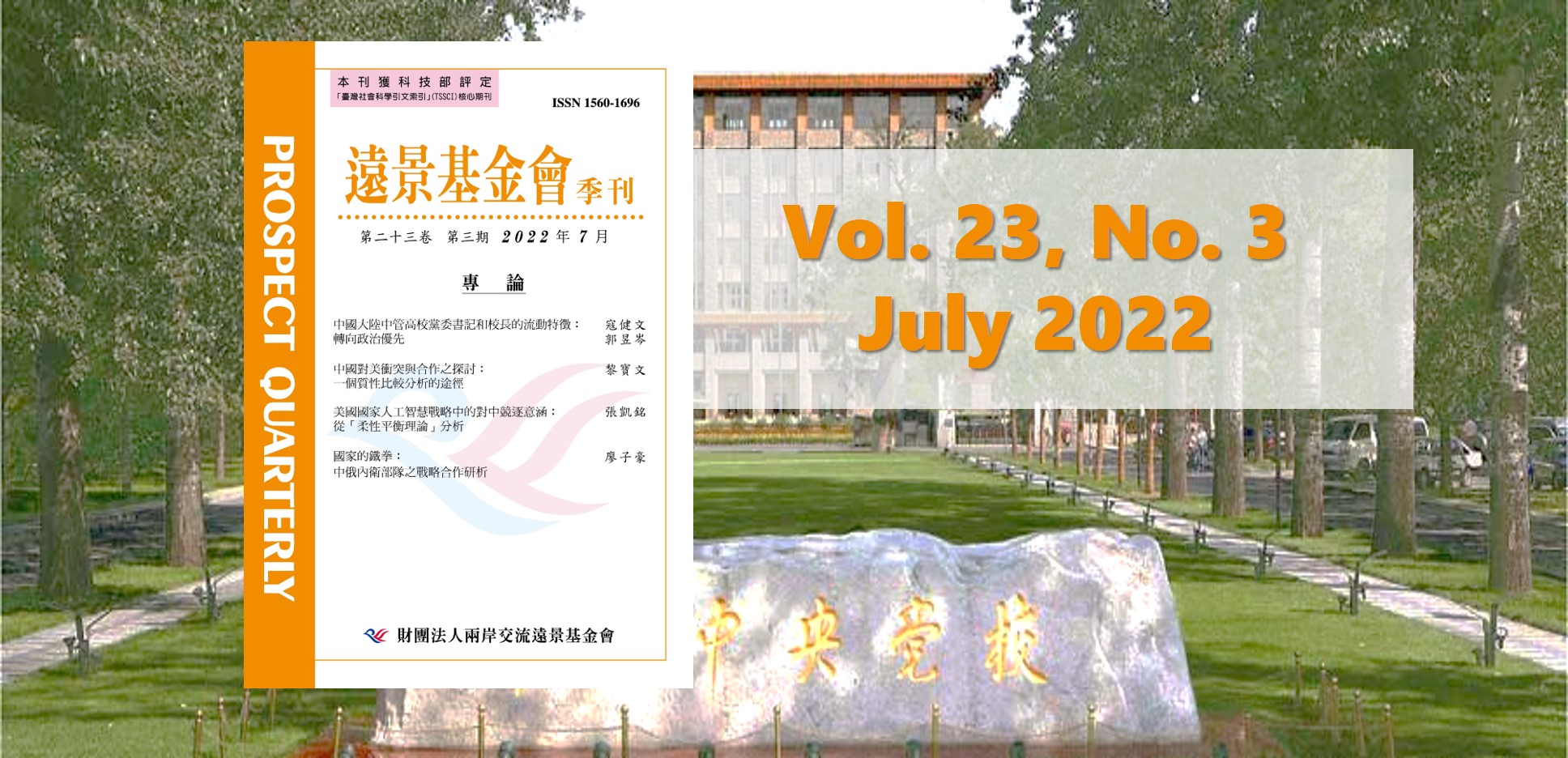Prospect Quarterly 23-3
The Mobility Traits of the Party Secretaries and Presidents of the Centrally Administrated University in China: Turning to Politics First
Chien-wen Kou
(Distinguished Professor, Department of Political Science and Graduate Institute of East Asian Studies, National Chengchi University)
Yu-tsen Kuo
(Postgraduate Student, Graduate Institute of East Asian Studies, National Chengchi University)
Abstract
This paper explores the changes in the Chinese Communist Party’s (CCP) selection of elite universities leaders since 2012. After analyzing 140 university presidents and party secretaries who received their appointments in the Hu Jintao and Xi Jinping eras, this paper found three major differences in mobility patterns. First, the importance of party seniority to both university presidents and party secretaries significantly increased. Scholars with young party age were unlikely to serve as presidents. Secondly, Western-trained Ph.D. and long-term overseas experiences were no longer the most salient professional credentials. Thirdly, some presidents who were local-trained Ph.D. holders and had weak overseas experiences had close ties with the People’s Liberation Army (PLA) or defense industry. Therefore, their appointments appear to be related to China’s technology policy. Accordingly, the current mobility pattern can be best described as “politics first,” whereby professional credentials may remain important but political credentials become indispensable requirements. This new model differs from the existing literature based on elite dualism and technology that emphasizes specialization.
Keywords: China, Elite Mobility, University Presidents, University Party Secretaries, Elite Dualism
The Sources of Conflict and Cooperation between China and the United States A Qualitative Comparative Analysis
Pao-wen Li
(Assistant Professor, Institute of China and Asia-Pacific Studies, National Sun Yat-sen University)
Abstract
This paper uses the political reports of the CCP national congress as raw data and applies qualitative comparative analysis to investigate the conditions and the relative importance of domestic and international factors influencing China’s policy toward the United States. The results of this analysis suggest that the conditions for China’s cooperation and conflict toward the U.S. are different. China’s revisionist preference is the necessary condition for its conflictive policy toward the U.S. However, when analyzing the conditions of China’s cooperative policy toward the U.S., a combination of American lead in the U.S.- China power parity and the U.S. cooperative policy toward China is the necessary condition to ensure China’s cooperation toward the U.S. In other words, without a revisionist proclivity, it is unlikely that China would choose to enter into conflict with the U.S., and China’s cooperation toward the U.S. is a reaction to Washington’s cooperation toward China and a reflection of the power disparity between the two countries.
Keywords: U.S.-China Relations, Chinese Foreign Policy, Chinese Communist Pa rty, Dome sti c Politi c s, Qua lit a tive Comparative Analysis
The U.S. National Artificial Intelligence Strategy and Impact of Competition with China An Analysis From the Soft Balancing Theory
Kai-ming Chang
(Assistant Professor, Center for General Education, National Taichung University of Science and Technology)
Abstract
This article analyzes the evolution of the U.S. national artificial intelligence (AI) strategy through the “Soft Balancing Theory” in the study of international relations. It shows that the U.S. government has linked the AI issue with foreign and defense policies and regards China as its main competitor. China’s rapid development in the field of AI has been defined as a threat to national security by the U.S. government. Given that there are still various common interests in the Sino-U.S. relations, the U.S. government has not confronted China directly but rather chose to use soft balance tactics to obstruct China’s AI research and innovation, such as expanding diplomatic coordination and imposing economic sanctions, in order to meet the needs of national security and interests simultaneously.
Keywords: U.S. National Artificial Intelligence Strategy, Artificial Intelligence, U.S. Foreign Policy, Soft Balancing Theory, Co-opetition Between Great Powers
The Iron Fist of the Nation: An Analysis of Strategic Cooperation between Chinese and Russian Internal Troops
Tzu-hao Liao
(Postgraduate Student, Department of War Studies, King’s College London, UK)
Abstract
This article examines the meaning of the joint exercises between Russia’s Rosgvardia (FSVNG) and China’s People’s Armed Police (PAP). While current research mainly focuses on institutions and their individual establishments, this paper provides a new perspective for examining strategic cooperation between the FSVNG and the PAP. The cooperation between the two forces is still subject to various limitations. In recent years, the two countries have seemingly intended to develop a normalized structure for further cooperation. Due to the international situation and the respective development of the two countries, however, many variables affect the levels and nature of this cooperation. Judging from the present trends, the two forces will possibly conduct Russian-led joint operations and will focus on rapid mobilization as key operational capabilities in future.
Keywords: People’s Armed Police, Rosgvardia, Internal Troops, Strategic Cooperation, Counter-terrorism

